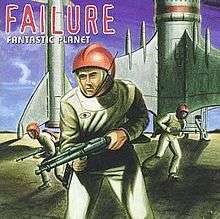Fantastic Planet (album)
| Fantastic Planet | ||||
|---|---|---|---|---|
 | ||||
| Studio album by Failure | ||||
| Released | August 13, 1996 | |||
| Recorded | F.P.S. Studios, Los Angeles; Madhatter Studios, Silverlake | |||
| Genre | ||||
| Length | 67:51 | |||
| Label | Slash Records/Warner Bros. | |||
| Producer | Failure | |||
| Failure chronology | ||||
| ||||
| Professional ratings | |
|---|---|
| Review scores | |
| Source | Rating |
| AllMusic | |
Fantastic Planet is the third studio album by the American alternative rock band Failure, released on August 13, 1996. It was the last album released on Slash Records as distributed by Warner Bros. Records. The album failed to chart on Billboard 's Top 200 albums, but did produce a charting single with "Stuck on You", which reached #23 on Billboard 's Alternative Songs Chart.[2] The album was produced by Failure themselves in a process that took longer than their previous two albums, with one song being recorded and produced soon after being written, and repeating this process. Space-rock themes are present in the lyrics, as well as various indirect references to drug addiction, drug-related experiences, and prostitution. The artwork is based on the cover of the L. Ron Hubbard novel Return to Tomorrow. Seven of the album's songs were also included on Failure's Essentials, a best-of collection from 2006.
In 2009, JustPressPlay named Fantastic Planet the third-best album of the 1990s.[3] They also ranked the song "The Nurse Who Loved Me" at #10 in its list of the Top 100 Songs of the 1990s.[4]
On March 24th 2015 it was announced the album was to be reissued on 180g clear and 120g black vinyl via the band's own PledgeMusic page.
Track listing
All tracks written by Ken Andrews & Greg Edwards
- "Saturday Saviour" – 4:27
- "Sergeant Politeness" – 4:05
- "Segue 1" - 1:54
- "Smoking Umbrellas" – 3:58
- "Pillowhead" - 2:09
- "Blank" – 5:38
- "Segue 2" - 1:17
- "Dirty Blue Balloons" – 4:23
- "Solaris" – 3:43
- "Pitiful" – 4:45
- "Leo" – 3:05
- "Segue 3" - 2:11
- "The Nurse Who Loved Me" – 4:25
- "Another Space Song" – 5:10
- "Stuck on You" – 4:28
- "Heliotropic" – 6:14
- "Daylight" – 6:00
Personnel
- Ken Andrews – vocals, guitar, bass
- Greg Edwards – bass, guitar, percussion, piano
- Kellii Scott – drums
Credits
Produced by Failure; engineered by Ken Andrews. Recorded at F.P.S. Studios (Los Angeles CA) and Madhatter Studios (Silverlake CA). Mastered by Tom Baker at Future Disc (Hollywood CA).
Production notes
A music video was produced for the single "Stuck on You" which closely resembles the opening credits of the James Bond film The Spy Who Loved Me (included on the DVD portion of the 2004 Failure compilation Golden). Other songs, such as "Saturday Saviour" and "Pitiful", were released as radio singles, but no music videos were made for them.
Guitarist Troy Van Leeuwen joined Failure around the time of this album's release.
The album art is closely based on an illustration by Ed Valigursky used for the book jacket of the first edition of Scientology founder L. Ron Hubbard's 1954 novel To the Stars.
Chart Position
"Stuck On You" had charted on Billboard's Alternative Rock (January 11th) and Mainstream Rock charts (January 25) in early 1997. The single left both charts nine weeks after appearing.
Singles
| Year | Song | Chart peak positions | ||||
|---|---|---|---|---|---|---|
| US |
US Alt Rock[5] |
US Main Rock [6] | ||||
| 1997 | "Stuck On You" | — | 23 | 31 | ||
| "—" denotes releases that did not chart. | ||||||
Influences
- "The Nurse Who Loved Me" was covered by A Perfect Circle on their 2003 album Thirteenth Step.
- "Another Space Song" was covered by Statistics, the solo project of Denver Dalley of Desaparecidos, and released on Location is Everything Vol. 2, a Jade Tree Records sampler disc.
- "Stuck on You" was covered by Paramore on their 2006 CD The Summer Tic EP; the title of the CD is taken from the song's lyrics, albeit with "tick" changed to "tic".
- "Smoking Umbrellas" was covered by Phil Ritchie on Rock Star: Supernova, and was also covered by SouthFM.
- "Sergeant Politeness" was played live at solo concerts between 2004 and 2006 by Melissa Auf der Maur with her band Auf der Maur. A recording of a rendition was released on her Single "Taste You".
- New York alternative rock band Pillowhead is named after the track of the same name.
References
- ↑ AllMusic review
- ↑ "Failure Album & Song Chart History".
- ↑ Matt Medlock (28 October 2009). "Fifty Years of Great Music: The Top 100 Albums of the 1990s". JustPressPlay.net.
- ↑ Matt Medlock (28 September 2009). "Fifty Years of Great Music: The Top 100 Songs of the 1990s". JustPressPlay.net.
- ↑ Music Chart. "Failure - Chart History (Alternative Rock)". Billboard. Retrieved 15 July 2015.
- ↑ Music Chart. "Failure - Chart History (Mainstream Rock)". Billboard. Retrieved 15 July 2015.
External links
- RockNet interview with Kellii Scott about the album (November 1996)